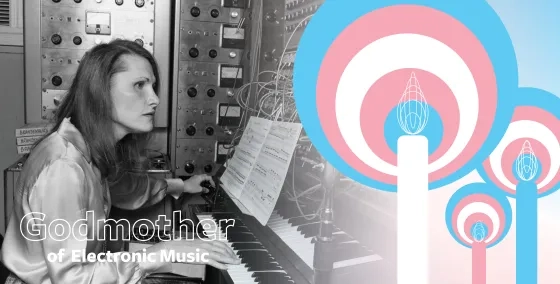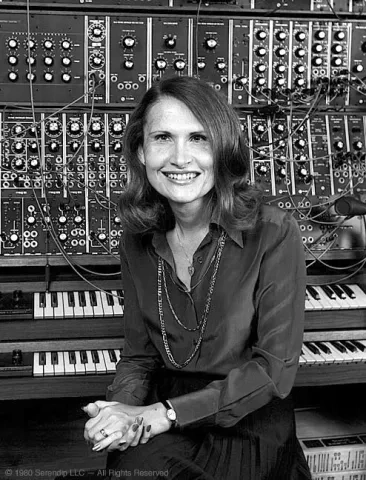Meet Wendy Carlos: Transgender Pioneer and Electronic Music Icon
In honor of International Transgender Day of Visibility, SFCM is shining a spotlight on the pioneering electronic music artist Wendy Carlos and her lasting impact on the music industry and the Technology and Applied Composition program.
1968 was a monumental year in American history. Martin Luther King was assassinated, Yale announced it would begin admitting women, President Lyndon B. Johnson signed the Civil Rights Act and Shirley Chisholm became the first African-American woman elected to Congress.
Those 365 days also saw a staggering amount of pop-culture watershed moments, from 2001: A Space Odyssey, to The Beatles’ "White Album" and even Mister Rogers' Neighborhood.
But there was another musical phenomenon lurking in the wings: Switched-On Bach, a 1968 album of Johann Sebastian Bach's compositions performed on the then-novel Moog synthesizer. The record was a smash, staying atop the Billboard classical charts for over three years, becoming the second classical album ever to go platinum, and made the Moog internationally famous.
Switched-On Bach was the work of Wendy Carlos, an unassuming figure who would loom large in the popular imagination years later, when she became one of the first transgender individuals to openly speak about her transition.
Born in Pawtucket, Rhode Island in 1939, Carlos graduated from Brown in 1962 with dual degrees in music and physics, and subsequently earned her master's degree in music composition at the groundbreaking Columbia-Princeton Electronic Music Center in 1965. While the musical accomplishments of Switched-On Bach are instantly obvious, the technical tinkering that Carlos did on her instrument in collaboration with its inventor, Bob Moog, are less so. Together they laid the groundwork for the synthesizer’s foothold in the music industry.
“Moog had a reputation for taking good care to listen to his customers,” said composer and SFCM Technology and Applied Composition Professor Shawne Workman, “and Wendy Carlos clearly had a lot to say. Synthesis histories note Carlos urging Moog to add the touch-sensitive keyboard that made his synthesizers so approachable and expressive. Her input influenced the filter bank that became such an important part of the Moog sound, and the portamento control that enabled keyboardists like Keith Emerson to produce the iconic pitch glides of 1970s rock.”
While the work of Wendy Carlos magnified the Moog influence, Carlos’ impact does not stop there, many music historians recognize Switched-On Bach as launching the electronic music genre, including electronic dance music (EDM). Bob Moog himself even credited the album as introducing the world to electronic music. He would later tell People Magazine of Carlos’ skill with making new sounds from the synthesizer, “Nobody is in her league.”
While remaining largely out of the limelight Wendy Carlos continued to find success, working with the score for films A Clockwork Orange, and The Shining. Carlos transitioned in 1972, but still retreated from the public eye, and notably turned down visits from celebrities like George Harrison and Stevie Wonder who sought her insights into synthesizers.
She rarely spoke of her transition, but in the 1980s gave one interview where she opened up publicly about who she was, telling People magazine, “The public turned out to be amazingly tolerant or, if you wish, indifferent.”
Carlos continually put out music until the late ‘90s—she composed the original Tron soundtrack and at one point released an album of humorous adaptations of Profokiev and Saint-Saëns with “Weird” Al Yankovic. But despite her seemingly self-imposed absence from the music industry, her influence has only grown as a new generation of synthesists discovers her work and her impact on electronic music.
“Today’s tools and styles evolved from those times—from the work of Carlos, Moog, and other pioneers,” Workman said. “You can see it in current hardware and software that emulate Moog portamento and filters, and hear it in soundtracks that take inspiration from Carlos’ use of Dies Irae and haunting synth pads in The Shining. Their stories can help TAC students understand why current hardware and software operate as they do, and how we got where we are in the ever-expanding use of electronics in music and sound design, in pop, concerts, film, games—you name it.”
Though her choice to step into the spotlight has been few and far between, the legacy of the aptly called Godmother of electronic music, lives on to inspire new generations, especially in an era of music where young musicians are continuing to push boundaries in the world of music. Workman says, “It’s a wonder to see TAC students build on that legacy of experimentation and creativity, working with vintage analog hardware like the Moog or any of the enormous variety of digital instruments available now.”
Learn more about Diversity, Equity, and Inclusion efforts at SFCM or studying Technology and Applied Composition.

